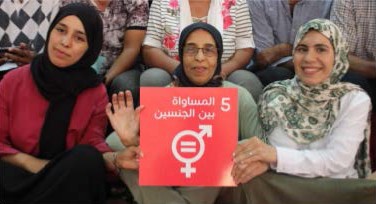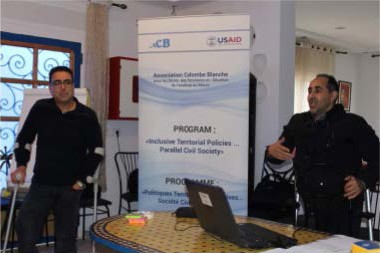Speeches Shim

USAID/Morocco has partnered directly with five Moroccan civil society organizations since 2016 to establish a network of over 200 local civil society organizations. USAID builds the capacity of the five Civil Society Organization (CSO) partners to strengthen the CSO network’s ability to more effectively advocate for change with the Moroccan government, listen to their constituents, mobilize resources, and seek collective impact. The organizations are:
- Mouvement Alternatives Citoyenne (ALCI) is an association that promotes equitable and participatory socio-democratic development, and advocates for economic, social, and civic rights. ALCI is increasingly recognized for its expertise in the field of local finance and budgeting.
- Association Colombe Blanche pour les Droits des Personnes en Situation de Handicap, or White Dove, is an organization that strengthens civil society by promoting inclusive local development, strengthens the capacity of NGOs active in the disability field, and promotes political participation of persons with disabilities.
- Association Marocaine De Solidarité et de Développement (AMSED) is a CSO which advocates for increased participation in the formulation, implementation, and monitoring and evaluation of public policies. AMSED is a traditional partner of the Moroccan Health Ministry in the areas of HIV/AIDS and tuberculosis.
- Association Ennakhil is an organization whose mission is to popularize and promote the rights of women and their children. Association Ennakhil manages a renowned regional gender-based violence listening center.
- Forum Azzahrae for Moroccan Women is a national women's rights association that works on women's and family issues through an innovative approach that uses an Islamic lens to address gender equality issues.
During the COVID-19 pandemic, these organizations have been actively working with their constituents with USAID support to mitigate the impacts of the outbreak on vulnerable populations in their communities.
Ennakhil Association, one of our two women-focused CSOs, received additional support from USAID as well as the United Kingdom to respond to the spike in gender-based violence (GBV) during the COVID-19 epidemic. Their programming includes advocacy for GBV legislation, staffing and resourcing discrete listening centers for women seeking assistance, providing shelter in severe cases of abuse, and vocational training for women who are at highest risk and must flee their homes. The UN Women’s May 19 world-wide newsletter, Voices from the ground: Impact of COVID-19 on violence against women, specifically noted the rise in violence and Ennakhil’s response in Morocco.

The White Dove Association (Association Colombe Blanche) for the Rights of Persons with Disabilities (PWD): Despite important national efforts to contain the COVID-19 pandemic and its effects, considerations for persons with disabilities were not included in the overall measures taken by Government of Morocco, especially with regard to: access to all relevant information, medical and paramedical services, distance education, and food supplies provided to persons in need. Persons with Disabilities (PWD) may be further exposed to isolation, loss of independence and worsening of the degree of disability caused by the interruption of services normally provided to them. This is in addition to the economic and psychological burdens on their families that existed prior to the pandemic. In order to overcome the challenges faced by PWD and their families during this crisis, the White Dove Association, with USAID support, will be implementing four key solidarity and humanitarian initiatives: 1) support the national advocacy initiative of networks and coalitions working in the field of disabilities to implement the national policy related to the management of the COVID-19 crisis; 2) support the access of 1,000 PWDs and their families to essential information related to the national policy for managing the COVID-19 pandemic and provide medical and paramedical support to prevent the spread of coronavirus; 3) support opportunities for continued education and distance learning for PWD and/or students with special needs to ensure the continuation of their education and skills development for micro-entrepreneurship or self-employment; and 4) build capacity of partner organizations in the areas of crisis management and monitoring PWD needs during crises.
Mouvement Alternatives Citoyenne (ALCI), with USAID support, and adapting to the national confinement due to COVID-19, held a virtual town hall/webinar on May 21, 2020 to discuss participatory budgeting at the national level. The webinar featured CSOs, finance experts, and a representative of the Ministry of Finance. The aim of the webinar was to discuss ways to open the budget-making process for participation of CSOs and citizens in view of enhancing transparency in the public financial system. The event has been viewed by more than 7,000 people and the recording is still frequently referenced and viewed across Moroccan social media platforms.
Following the success of the webinar, ALCI organized an online training on advocacy on June 6, 2020, aimed at enhancing CSO capacity to advocate for a more open national budget by developing sound proposals for the 2021 Budget Law. The training was attended by over 30 CSOs, enhanced the participants’ understanding of the budget cycle, and provided them with techniques and skills in developing sound proposals and successfully advocating for them to the executive levels of government and parliament.
All five CSOs supported by USAID/Morocco have continued advocating for an improved legal framework for civil society and public participation in Morocco, with USAID support. On April 13, 2020, and as part of these efforts, the MIRLA (Mouvement des Initiatives pour la Réforme des Lois des Associations au Maroc) coalition addressed a letter to the Head of Government, inviting him to capitalize on the capacities of civil society to increase the COVID-19 national response effort. The letter also highlighted the need to prepare for the post-pandemic era by strengthening civil society's involvement in decision-making. By adopting a number of urgent reforms, the government could empower civil society to play a more effective role during and after crises. In addition to the five CSOs supported by USAID/Morocco, more than 240 signatory associations called on all Moroccan civil society associations to increase their mobilization to face the pandemic and its after effects through more collaboration with government stakeholders.
All five USAID-funded CSOs hosted a virtual town hall meeting on May 6, 2020 to discuss the important role of civil society organizations in COVID-19 pandemic response efforts (see part 1 and part 2). The event featured civil society organizations, government representatives, parliamentarians, and academics. The inclusion of CSOs is crucial given that they have proven to be the closest organizations to vulnerable groups during the COVID-19 pandemic, especially regarding people with disabilities, women, and inhabitants of rural and mountainous areas. The event has been viewed by approximately 1,900 people and the recording is still making the rounds in Moroccan social media. The event will be followed by substantive advocacy campaigns that aim to improve the legal environment for CSOs so that they are more empowered to work during situations of crises like the COVID-19 pandemic.
While the nation-wide confinement due to the COVID-19 pandemic has posed numerous challenges, the flexibility and perseverance of USAID-supported CSOs to take their advocacy efforts online has matured and led them to engage an even greater number of citizens across the country. The support provided to these CSOs by USAID/Morocco and USAID/Washington’s Local Works has enabled these CSOs to effectively respond to a national crisis and continue to advocate for their constituents despite the unique challenges imposed by COVID-19.

Comment
Make a general inquiry or suggest an improvement.